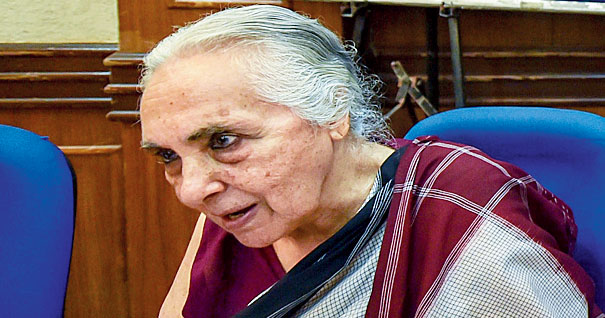The five eminent persons who had moved court against the August 28 arrests of five civil liberties activists for alleged Maoist links welcomed the Supreme Court verdict on Friday although their plea for a court-monitored probe was rejected.
The top court rejected the plea for immediate release of the activists, also accused of involvement in the Bhima-Koregaon violence in which one person died on January 1, and said they would remain in house arrest for four more weeks, but added that they would have the liberty to seek legal remedies during this period in an appropriate court that can consider the case on merits.
The five who had moved the Supreme Court were historian Romila Thapar, economists Devaki Jain and Prabhat Patnaik, sociologist Satish Deshpande and human rights defender Maja Daruwala.
They said in a statement: “Our petition was essentially an appeal to the Supreme Court to check this erosion of rights and protect the liberty and dignity of human rights activists. Today’s judgment has provided protection to the activists for a further period of 4 weeks and has given them the liberty to seek remedy from the appropriate courts.”
It added: “Our stand in this case finds vindication in the dissenting opinion of (Justice) D.Y. Chandrachud who has categorically held that liberty cannot be sacrificed at the altar of conjecture, and that the police had been taking liberties with the truth and besmirching the reputation of the activists by doing a media trial.
“Under such circumstances, the police’s ability to conduct a free, fair and impartial investigation is in serious doubt, as has been held by (Justice) D.Y. Chandrachud.”
At a news conference, the petitioners, except Jain, and their lawyer Vrinda Grover welcomed the outcome of the trial as, they felt, it had shown people that misuse of anti-terror laws was not solated.
Patnaik said: “The very fact that the SC recognised and took cognisance of our petition is itself a matter of great significance. In other words, it actually said that no, these cannot just be treated as criminal cases. These are constitutional rights involved…
“Secondly, during this entire month, the whole country has been listening to it. There is a sensitisation of the population to the kind of things that are going on which are a threat to democracy.”
He added: “If the Supreme Court were of the view that these people were Maoists, why would the court give them four weeks of house arrest instead of putting them in jail? For the simple reason, that even in the majority verdict there is a certain reservation that you cannot really treat these people as criminals.”
Senior advocate Grover said: “Even the majority judgment considers it a case where liberty should be protected, therefore four weeks have been given and they are free to seek their legal rights and also seek remedy from the appropriate court.”
Thapar saw a vindication of the petitioners’ stand in the four-week extension of house arrest.
“We got together because there has been a mood in the country for some time now, of being rather aware of the fact that democratic freedoms which are taken for granted are being reduced, to put it mildly. Democracy has to function on freedoms. Democracy cannot function on repression; it cannot function on stopping people from talking or acting.”
Daruwala, the daughter of the late Field Marshal Sam Maneckshaw, said: “The police have received no go ahead to arrest. They have received a go ahead to do their investigation in a legal way, not to harass or to make unnecessary incarceration…. Arrest comes at the end of a viable process of investigation. It is not meant to be the first action on a fishing expedition.”
The dissenting verdict was quoted extensively in the news conference. Grover quoted from it in the end: “If this court were not to stand by the principles which we have formulated we may witness soulful requiem to liberty.”











